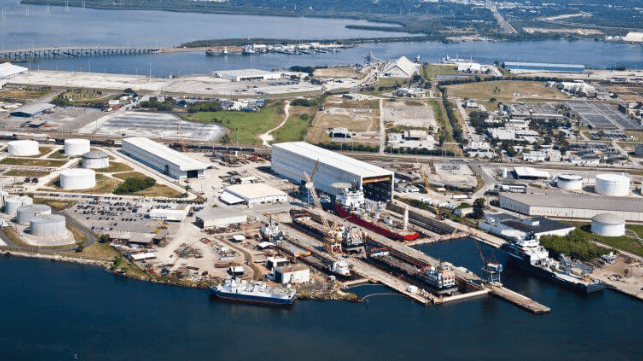Chouest and HD Hyundai Partner Up to Build Boxships in the United States

Edison Chouest Offshore, a builder and operator of OSVs and other workboats, has reached an agreement with HD Hyundai to begin building container ships in the U.S. before the end of the decade. It would be Chouest's first venture into this vessel class.
On Sunday, HD Hyundai confirmed that it has signed a partnership agreement with Chouest to cooperate on the construction of dual-fuel LNG-powered, "mid-sized" container ships, beginning in 2028. The move would capitalize on a drive to solidify U.S.-Korean trade ties through cooperation in the shipbuilding industry, a priority in both Seoul and in Washington, D.C.
“The U.S. government is expected to place more naval and commercial vessel orders in the future,” KEXIM researcher Yang Jong-seo told Korea JoongAng Daily. “We’ll likely see more examples of companies entering the U.S. market by forming partnerships with local shipyards, as HD Hyundai has done.”
Chouest is known for building workboats and small specialty vessels, but it also has a shipyard capable of accommodating midsize merchant ships. It owns a repair yard with four graving docks, Tampa Ship, which is capable of handling ships up to 150,000 DWT and 900 feet in length. The site has a 34-foot-deep drydock channel and access to a 43-foot channel for transits. The yard has roots in the WWII-era shipbuilding surge, and has been owned by Chouest since 2008.
The largest container ships ever built in the United States are Matson's 3,600-TEU Aloha-class vessels, built at Hanwha Philly Shipyard. Ships of this size would fit into the Tampa Ship facility without need for drydock expansion. The Aloha-class vessels are profitable but small by modern standards: Most ships serving the major U.S. gateway ports on long-haul international routes are typically in the 8,000-14,000 TEU range, with occasional visits from larger vessels.

that matters most
Get the latest maritime news delivered to your inbox daily.
Chouest and HD Hyundai's partnership may extend beyond container ships. In a statement, they said that there could be room for expansion into other vessel classes and asset types, like port cranes.
Separately, Chouest has announced a new partnership with Bollinger to bid for the construction of new midsize icebreakers for the U.S. Coast Guard.
